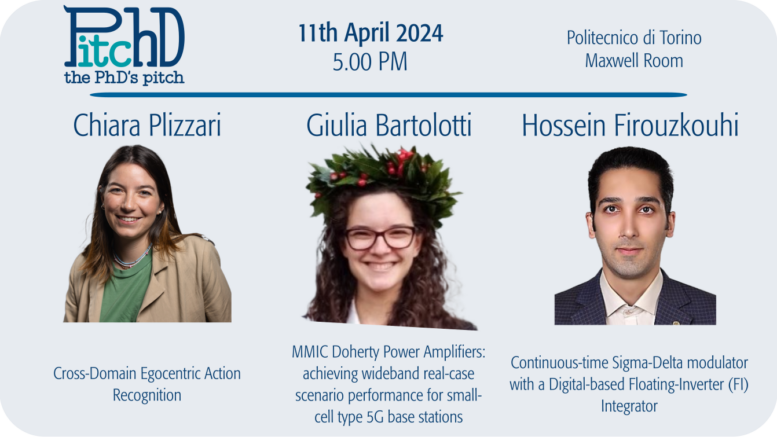11th April 2024 – 5.00 PM
Politecnico di Torino – Maxwell Room
Here’s the 2nd PitchD – the PhD’s pitch. Our PhD IEEE Student Members explain to students, colleagues and professors their research in-presence. Please, remember that registration is required to attend the event.

<h2 class="western"Cross-Domain Egocentric Action Recognition
Ms. Chiara Plizzari
Dept. of Department of Automation and Computer Engineering, Politecnico di Torino
Biography: Chiara is in her third year Ph.D. in Computer Vision at Politecnico di Torino, supervised by Professor Barbara Caputo. Her main research interest is video understanding in the presence of domain gaps, and how to use information from multiple information channels for cross-domain activity recognition. During her PhD she visited the Machine Learning and Computer Vision lab at University of Bristol under the supervision of Professor Dima Damen, and the Berkeley Artificial Intelligence Research Lab (BAIR) in California, collaborating with Professor Angjoo Kanazawa. Chiara is also part of the ELLIS network. Prior to her PhD, Chiara completed a M.Sc. degree in Computer Science Engineering at Politecnico di Milano.
Abstract: Egocentric action recognition is becoming an increasingly researched area thanks to the rising popularity of wearable cameras. In egocentric vision, there is a far higher degree of changes in illumination, viewpoint and environment compared to a fixed third person camera. Despite the numerous publications in the field, egocentric action recognition still has one major flaw that remains unsolved, known as “environmental bias”. This problem arises from the network’s heavy reliance on the environment in which the activities are recorded, which inhibits the network’s ability to recognize actions when they are conducted in unfamiliar (unseen) surroundings. To this purpose, she will show how to solve auxiliary tasks across various information channels from videos in a way that makes the solution of such tasks consistent across information channels and gains robustness from it. Additionally, she will also focus on the possibility to use event data to reduce the impact of the domain shift by using different hardware than standard RGB cameras.
MMIC Doherty Power Amplifiers: achieving wideband real-case scenario performance for small-cell
type 5G base stations
Ms. Giulia Bartolotti
Dept. of Electronics and Telecommunication Engineering, Politecnico di Torino
Biography: Giulia Bartolotti received her Bachelor’s degree in Electronics Engineering and, after an internship in the telecommunications field, continued her studies at Politecnico di Torino with the Master
degree in Radio Frequency Systems Design, graduating in 2023. She is now a PhD student in
Electrical, Electronics, and Communications Engineering at Politecnico di Torino. Her research
activity focuses on the design of multi-stage power amplifiers to create efficient, linear, and load insensitive power amplifiers.
Abstract: The evolution of wireless communications towards higher data rates requires higher
complexity modulation schemes, which leads to a high peak-to-average power ratio (PAPR). This requires power amplifiers (PA) to operate at lower power levels with respect to saturation, specifically within a given back-off (OBO) range. The Doherty amplifier (DPA) is one of the most popular solutions for back-off efficiency
enhancement thanks to its rather simple design. Single-stage hybrid DPA demonstrators with excellent bandwidths have been presented in the literature, but they have limited gain and are far from real-case scenarios.
The multi-stage examples available present considerably narrow bandwidths. In my research activity, I applied wideband single-stage solutions from the literature to twostage integrated PA targeting real-case scenario power and gain while maintaining wideband capabilities. As a result, a Monolithic Microwave Integrated Circuit (MMIC) GaN DPA for small-cell type 5G NR base stations has been fabricated and characterized.
Continuous-time Sigma-Delta modulator with a Digital-based Floating-Inverter (FI) Integrator
Mr. Hossein Firouzkouhi
Dept. of Electronics and Telecommunication Engineering (DET), Politecnico di Torino
Biography: Amirhossein Ahmadi earned his B.Sc. in Electrical Engineering in 2016 from the Iran University of Science and Technology, and his M.Sc. in the same field in 2019 from Shiraz University of Technology. He became part of the Ph.D. Program in Electrical, Electronics, and Communication Engineering, supported by STMicroelectronics, which focuses on the critical reliability and performance requirements of next-generation electric vehicles, starting from the BMS. His expertise primarily lies in analog and mixed-signal integrated circuits, as well as performing analysis on the susceptibility to Electromagnetic Interference (EMI) of BMS systems.
Abstract: This project focuses on designing and simulating an ultra-low-power digital-based continuous-time 1st order Sigma-Delta modulator (SDM) for sub-kHz bandwidth in Internet-of-Things (IoT) applications in 180-nm CMOS scaled technology. It addresses the trend of transitioning functionality to the digital domain in Very-Large-Scale Integration (VLSI) systems to meet energy, scaling, and area constraints in IoT networks. In the pursuit of this idea, the concept of All-Digital SD-ADC (AD-SDC) is proposed which emphasizes highly on integrated digital systems due to simplicity, energy efficiency, robustness, and flexibility. Notably, the project introduces a novel methodology using a floating-inverter-amplifier (FIA) technique to achieve energy efficiency in the nano-Watt range which provides a great opportunity to tackle the energy and area constraints in IoT networks. This approach aims to transfer the digital domain closer to the processors and address the challenges related to analog-to-digital interfaces, which are
critical components affecting system speed and resolution in IoT applications.


Be the first to comment on "PitchD 2024 edition: the 2nd PitchD"